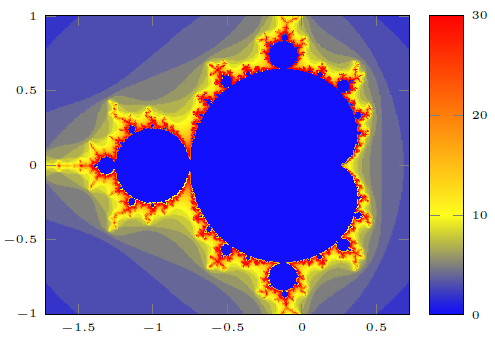The Mandelbrot consists of points whose boundary is a two-dimensional fractal shape. It is named after the mathematician Benoit Mandelbrot. It’s computed using a lot of iterations, that’s why we use Lua here for the calculation.
The sampling is done via \addplot3 and the coloring by surf and shader=interp. LuaTeX is required. And it runs a while. 😉
It was posted on TeXwelt.
Compiling this example takes too long for TeXlive.net, so you may get a timeout error.
%!TEX lualatex
\documentclass{standalone}
\usepackage{pgfplots}
\pgfplotsset{width=7cm,compat=1.8}
\usepackage{luacode}
\usepackage{pgfplots}
\pgfplotsset{width=7cm, compat=1.10}
\usetikzlibrary{calc, intersections} %allows coordinate calculations.
\begin{luacode}
function mandelbrot(cx,cy, max_iter, max)
local x,y,xtemp,ytemp,squaresum,iter
squaresum = 0
x = 0
y = 0
iter = 0
while (squaresum <= max) and (iter < max_iter) do
xtemp = x * x - y * y + cx
ytemp = 2 * x * y + cy
x = xtemp
y = ytemp
iter = iter + 1
squaresum = x * x + y * y
end
local result = 0
if (iter < max_iter) then
result = iter
end
-- result = squaresum
-- io.write("" .. cx .. ", " .. cy .. " = " .. result .. " (iter " .. iter .. " squaresum " .. squaresum .. ") \string\n")
tex.print(result);
end
\end{luacode}
\begin{document}
\begin{tikzpicture}
\begin{axis}[
colorbar,
point meta max=30,
tick label style={font=\tiny},
view={0}{90}]
\addplot3 [surf,domain=-1.5:0.5,shader=interp,domain y=-1:1,samples=300] {
\directlua{mandelbrot(\pgfmathfloatvalueof\x,
\pgfmathfloatvalueof\y,10000,4)}
};
\end{axis}
\end{tikzpicture}
\end{document}

